Where I Am: A Fish Story
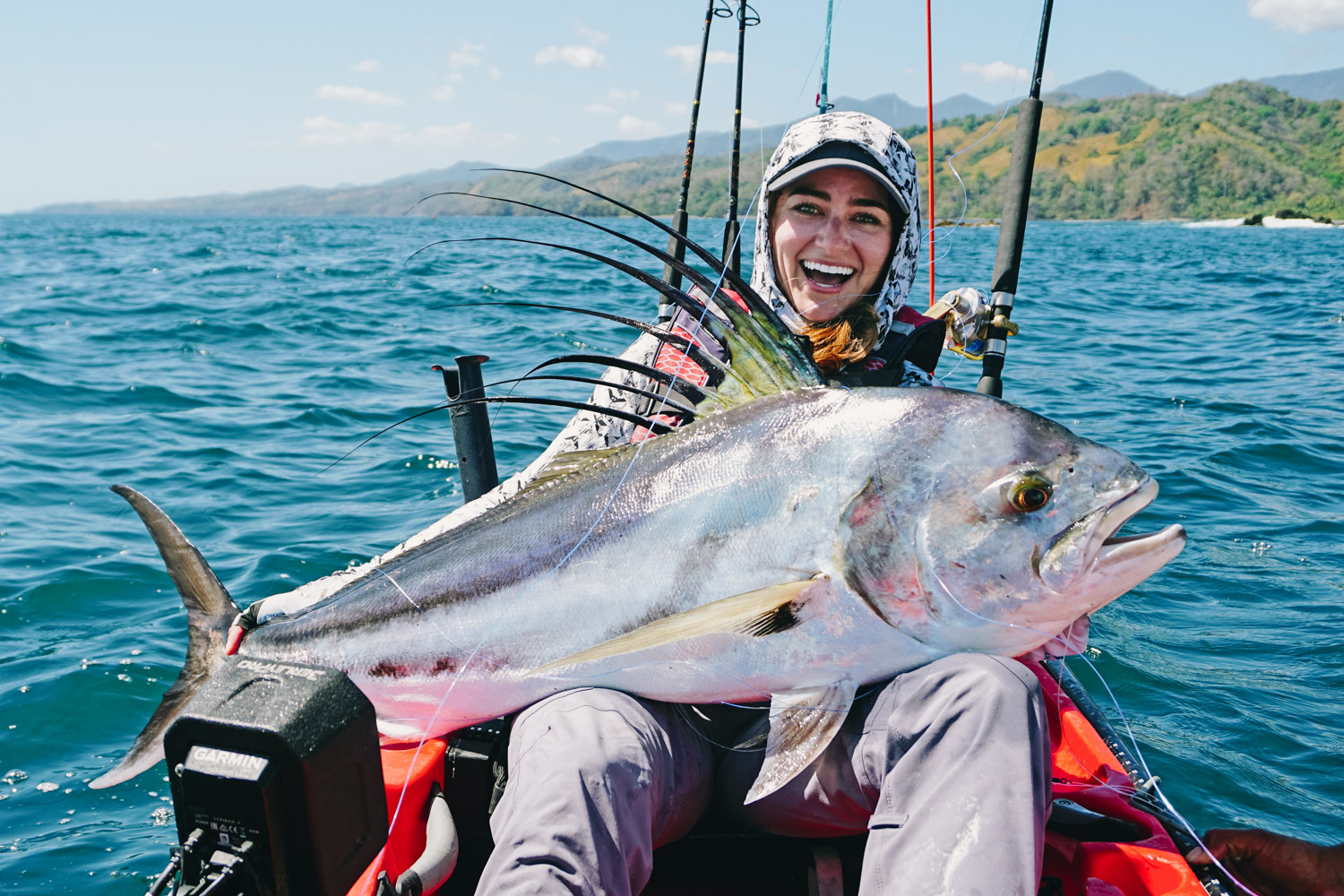
Where I Am: A Fish Story
By Natalie Dillon
It was like looking into a meteor shower: Ethereal streaks of silver and aqua darting through the dark blue of a hundred feet of Panamanian ocean. I stared over the side of my kayak, my slice of plastic bobbing and swaying in the Pacific swell. The schooling fish were beautiful, but suddenly I felt uneasy. This was the deepest I’d been.
My hands moistened inside their sun gloves as I gripped my fishing rod. I picked up my gaze and set it on my Garmin fish finder, taking note of the activity it marked below. Jacks, I thought. I’d caught several already that day—dense, muscular, angry fish.
That’s when I saw it—a dorsal fin slicing momentarily through the waves fifteen feet to my right.
I’d encountered sharks already. Maybe it was my headspace, but this one felt bigger. I looked around for the nearest kayaker from my group and saw a few silhouettes 100 yards toward shore. Mouth drying, I peddled toward them. Each time the water swelled around me and my kayak settled into a trough, the other kayakers fell out of sight. I pushed images from my mind of my kayak being chomped like a baby seal on Shark Week. That’s ridiculous, I told myself.
Still, the thought zinged through my knees.
I bowed my head against a gust of wind that whipped spray off the waves and nearly tipped me like it did another that morning. The buzz in my knees crept upward, first to my gut and then to my head. More wind. It felt as though the earth was closing in on me. “I’m safe,” I said aloud. I am safe.
But still, but still. I couldn’t help but ask myself what in God’s name I was doing here.
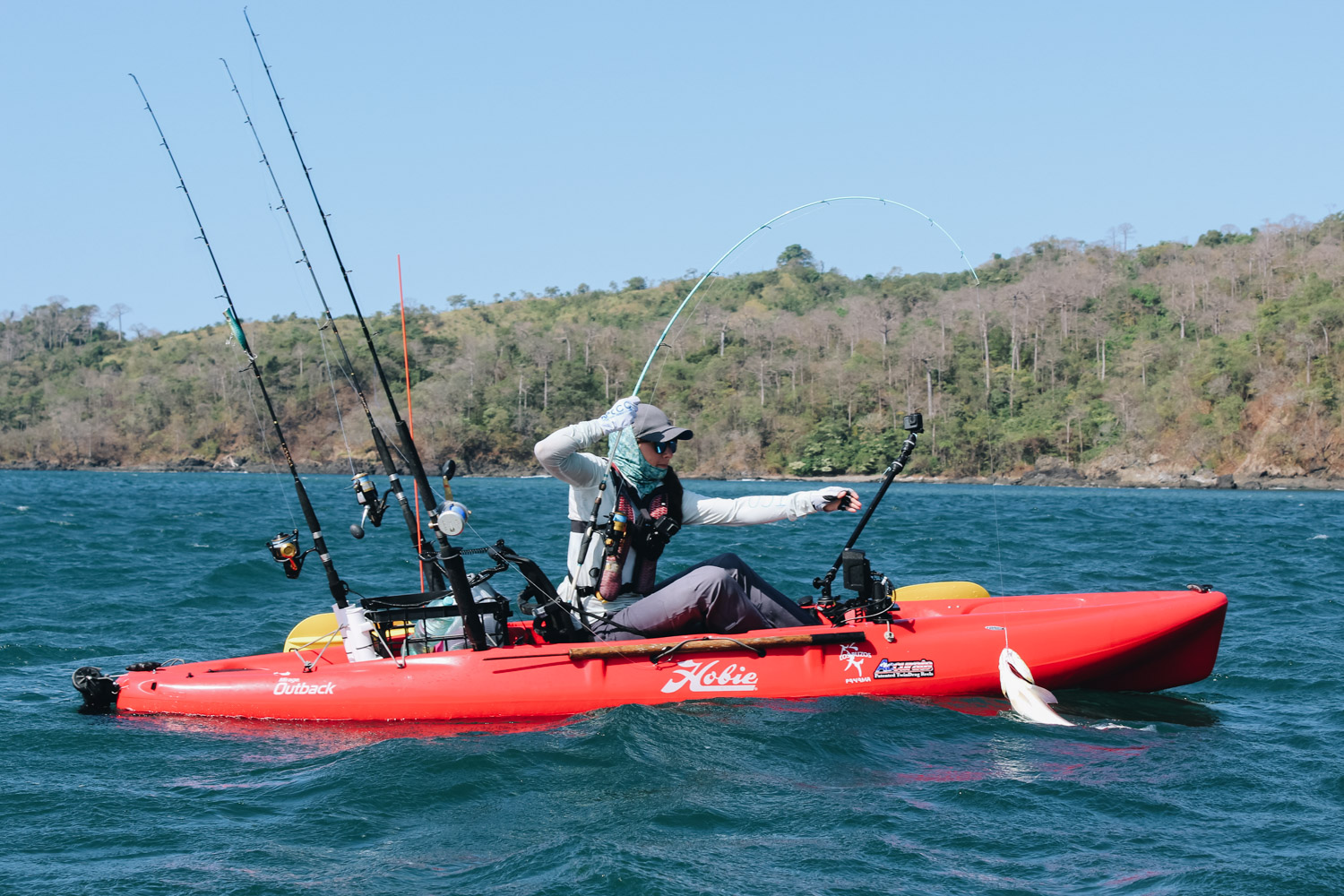
I didn’t think much when I booked a weeklong solo trip to Panama. I’d be traveling alone to Panama City where I’d have a day to myself. Then I’d meet a group of anglers I didn’t know, and we’d be bussed to a kayak fishing community six hours southwest on the rural Azuero Peninsula. There, we’d have five days to fish from kayaks in search of some of the coolest saltwater fish the world has to offer.
I’ve never identified as a fisherman, but I had been recreationally sportfishing for about six seasons and had gotten pretty “into it” over the last couple years. I’d picked up kayak fishing about six months earlier and had gained a newfound confidence after successfully landing and releasing a few muskies alone from my new vessel (the biggest and baddest fish of my home state of Minnesota). When an acquaintance recommended I check out this trip in Panama, I was all in.
This would be an adventure, and I’d be ready.
For years I’d wanted to catch a Roosterfish, a pez gallo. The great Pacific beauties are marked by their powerful build, vivid tiger stripes and giant “comb”—a spiny dorsal fin that’s somewhere between a grandiose crown and a funky mohawk.
Plus, I’d recently started documenting my outdoor adventures on YouTube as a career, and I felt this was a great chance to tell stories of what I’d encounter. But more than all this, I was excited about the opportunity to visit a new place and culture. I looked forward to stretching myself, both on the water and on land. This would be an adventure, and I’d be ready.
The night before the trip, I parked at a Best Buy to pick up a few extra GoPro batteries. I called a close friend from the car. Somewhere in the conversation, I began spewing my to-do list along with all the reasons I was not ready for this trip.
“I’m so not prepared,” I pleaded.
“You’ll be fine,” he said.
“But Central America alone?”
“You’ve traveled alone before.”
“But sharks, man, the ocean! It’s my biggest phobia!”
“And you’re the biggest badass I know for doing this.”
“But why am I even doing this?”
“Because you want to and you can.”
“But when will I ever just be able to BE HOME?”
I heard the words spill from my mouth as though I was listening to someone else say them, but I knew what they meant.
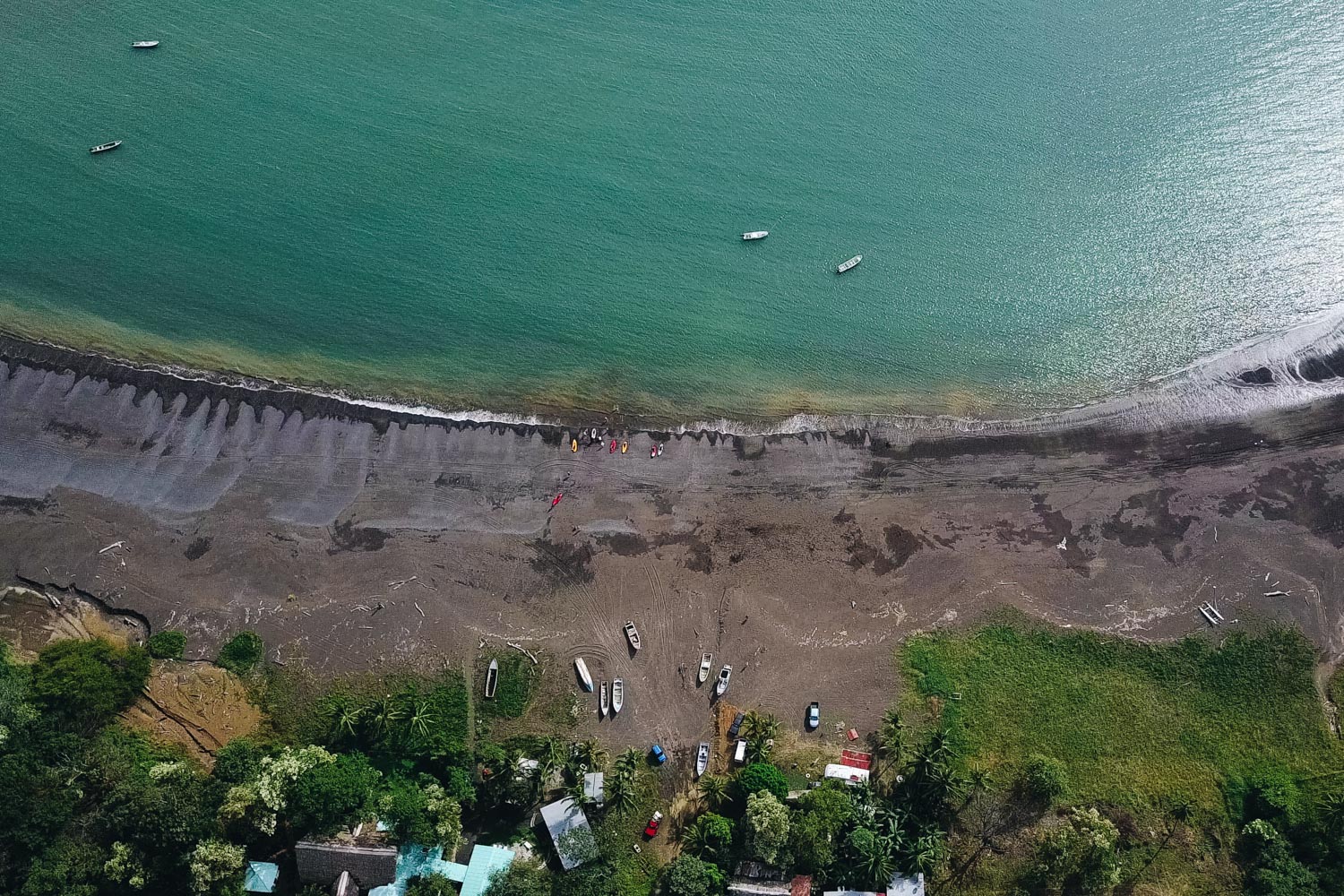
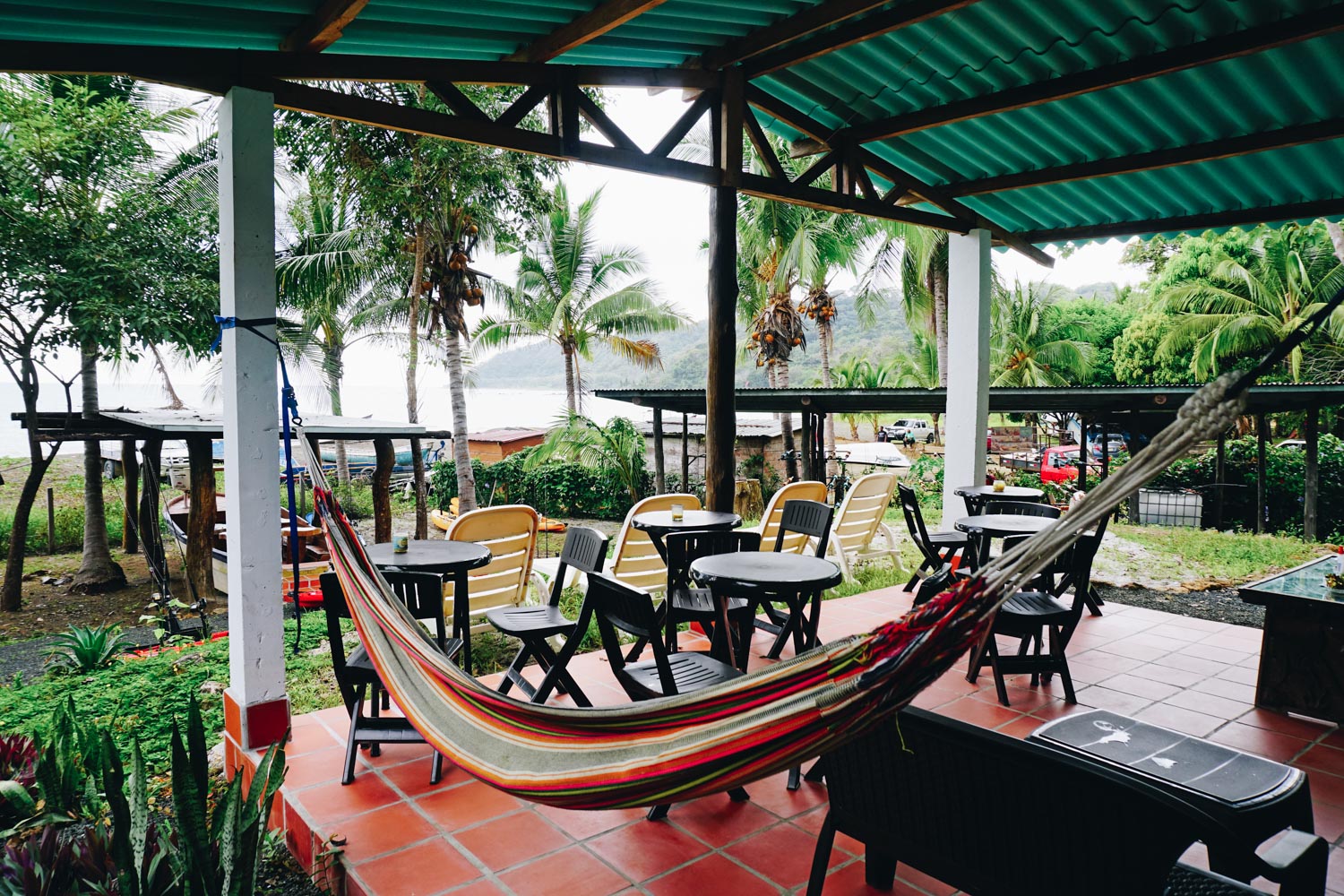
It wasn’t just that my career had me traveling nonstop, usually alone or with strangers. I was thirty. Three decades. I’d had a couple careers, a few homes, and a big failed relationship in which I was dumped out of the blue a couple months before my wedding.
My friends were married. So were my siblings. It felt like everyone close to me had kids and dogs and homes complete with a crackling fire and a home-cooked meal around a big table. And here was me: stressed, busy and alone, embarking on a trip that scared the crap out of me.
Was I really supposed to be traveling alone? Fishing so much? Was it really my purpose to be sharing stories on the Internet? Was any of this what I was meant to be doing?
It felt like everyone close to me had kids and dogs and homes… And here was me: stressed, busy and alone, embarking on a trip that scared the crap out of me.
The first few days in Panama proved tough. I was thrilled to be there, and the group was fantastic. But unseasonably heavy wind made the fishing extraordinarily challenging, and no one from the group had yet landed a big Roosterfish, which many of us hoped for most.
On the up side, I was feeling braver than expected on the water. Most of the time I was too focused—and everything too beautiful—for my heart to hold any space for fear.
The second half of the trip arrived, and this is when I found myself pedaling away from a rogue dorsal fin, having just felt utterly panicky for the first time all week. But I willed myself to calm down. I’d soon land a big, brawny African pompano on an artificial jig, my most exhilarating catch yet and my third tough fight of the day.
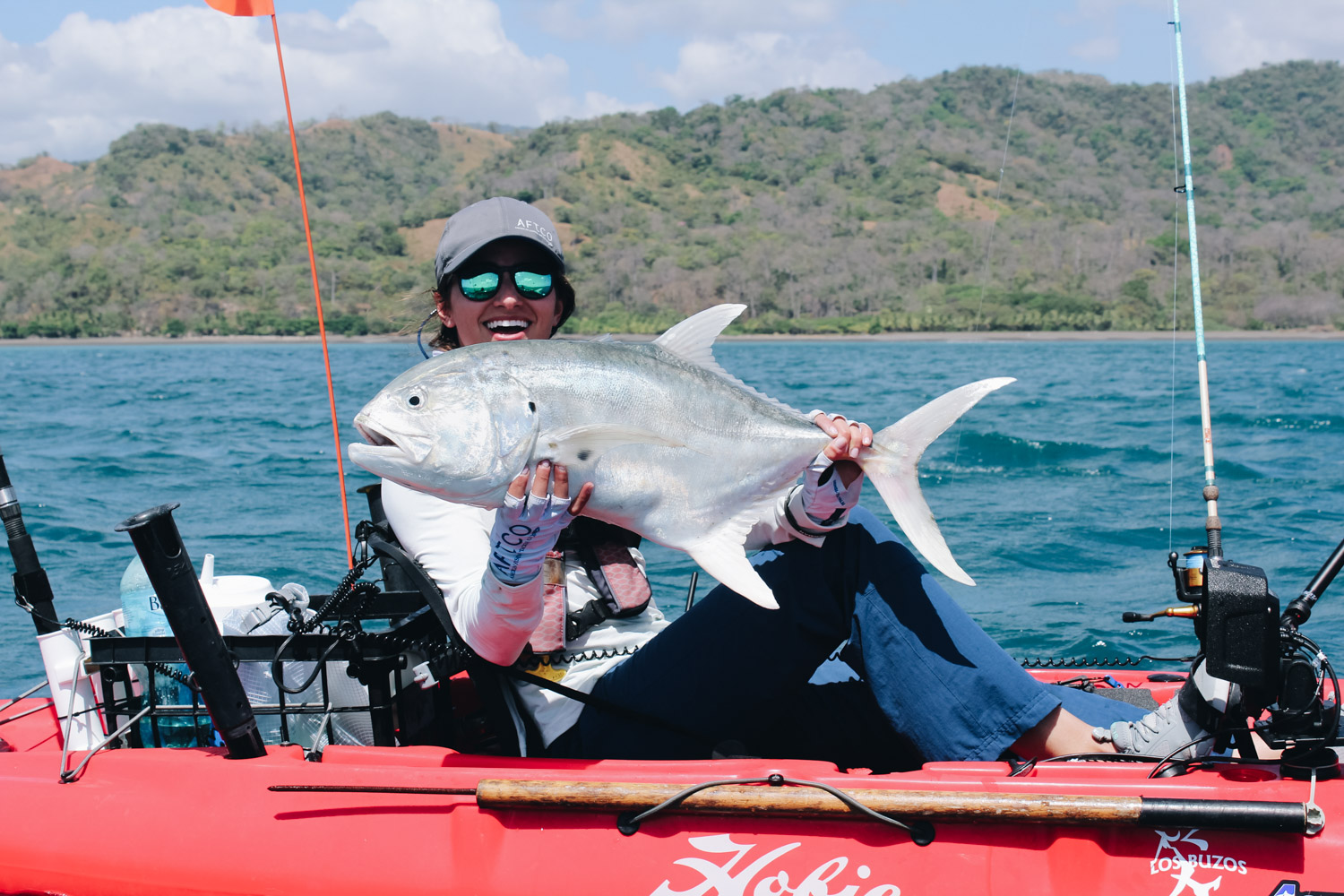
Natalie holds her African pompano.
The three guys in the Panga, the help boat, came over to take the pompano to save for dinner. I thanked the fish as they put it in their cooler. They passed me the live moonfish they’d just caught—great bait for Roosterfish.
“Go get yourself a gallo,” said Rob, the one American guide on board.
“I’m on it!” I gave a thumbs up.
“And watch those rocks,” he said.
I looked toward shore at the ragged outcropping I’d been avoiding all day. A wave pushed in, a mass of water bulging into the sky before breaking in a menacing, white storm.
I looped a circle hook through the mouth of the moonfish and let it out on 30 feet of line. I began pedaling slowly toward a break line where I’d marked some large fish earlier that morning.
Thirty minutes later, I heard it. Tick – tick – tick. The clicker on my reel began to scream. Something had taken my moonfish. I picked up my VHF radio. Tick – tick – tick. The rhythm grew faster with the beat of my heart.
“It’s Natalie. Something’s peeling my line,” I said to the radio. And then I did it: forced the drag lever to high to set the hook.
“Repeat?” I heard through the radio. But there was no time to respond. My rod immediately bent over from the pressure. I squeezed it with both hands, trembling and aching to hold on. Whatever ate my moonfish now cruised through the water, taking me on a sleigh ride fast enough to pull a skier. And it was headed…straight for the rocks.
The Panga closed in fifty feet to my right.
“What do I do about the rocks?” I called to them.
“You’re alright for now,” Rob shouted.
But the fish was picking up speed.
“You guys, the rocks!”
“Pump it! You have to pump it hard!” yelled the other guide Kevin through a smooth Honduran accent.
I rocketed the rod upward, reeled down, rocketed upward, reeled down. I was making progress. Cheers echoed from the Panga.
With each pull, I groaned. Sweat dripped from my forehead and stung my eyes. My biceps quivered. My shoulders and abs and glutes ached. The pressure unlike anything I’d felt before.
Suddenly the fish changed directions. It darted away from the rocks and headed toward open water. I’d later learn the Panga’s caption Richard had driven between the fish and the rocks, revving the motor to scare it away. A brilliant, possibly life-saving move. But I was too focused to notice.
My rod immediately bent over from the pressure. I squeezed it with both hands, trembling and aching to hold on.
For many minutes the war waged on, my hands and arms and body aching like never before. I struggled to keep my rod oriented toward the bow of the kayak and to manage my rudder so the fish wouldn’t tip me, but it was everything I could do to just hold on.
I groaned, I sighed, I laughed out of bafflement and exhaustion. But I was winning. I could feel the fish was just a few yards out now. Then, it took a dive. Suddenly all the pressure yanked straight down beneath my kayak, and my rod planted itself on the gunnel. I tried with all my might to raise it up, but the force was too strong. This was bad. But I had a thought. I pressed my fingers against the lever that controlled my reel’s drag. I intended to back it off just a millimeter to buy me the release I’d need to regain control. It budged, but in an instant the force ripped it fully loose. My line splayed everywhere in a giant, tangled bird’s nest around my reel.
My heart sank.
After nearly fifteen minutes of my life’s greatest fight, I had lost all pressure on the fish. I grabbed the line and began hand-over-hand pulling up the slack. It was a reckless move, I knew it.
The Panga banged against my kayak.
“Throw me the line,” Kevin yelled.
I did as he asked and began trying to sort out the mess around my reel.
“I think it’s still there,” I yelled.
“It’s here! I can see it,” called Kevin.
“Cuidado, amigo,” Rob said. Though Kevin was wearing gloves, the force of the line could easily burn him, or much worse. But the fish was right beneath the boat now.
“I see it. I see color!” Kevin yelled.
“It looks like a Rooster. It looks like a big Rooster,” Rob called, his voice somewhere between a shout and a laugh. “This is cra-ha-ha-hazy!”
“Is it really?” My heart was racing.
“It’s huge. I see it!” called Kevin. And then, in one heroic swing, he hoisted a four-foot specimen of prime Pacific Roosterfish out of the sea.
“That, Nattie, is a FISH!”
I flung my arms in the air and let out a wail. I was overcome with exhausted laughter. We all were. A blurred minute later I’d have the biggest fish of my life thrashing on my lap, water flying from its vivid white, charcoal and purple stripes, its black and green comb brushing against my face. This was not just a Roosterfish—this was a trophy-sized, lifetime pez gallo. My cheeks ached from smiling.

Triumphant with the catch of a lifetime, Natalie smiles with her Roosterfish.
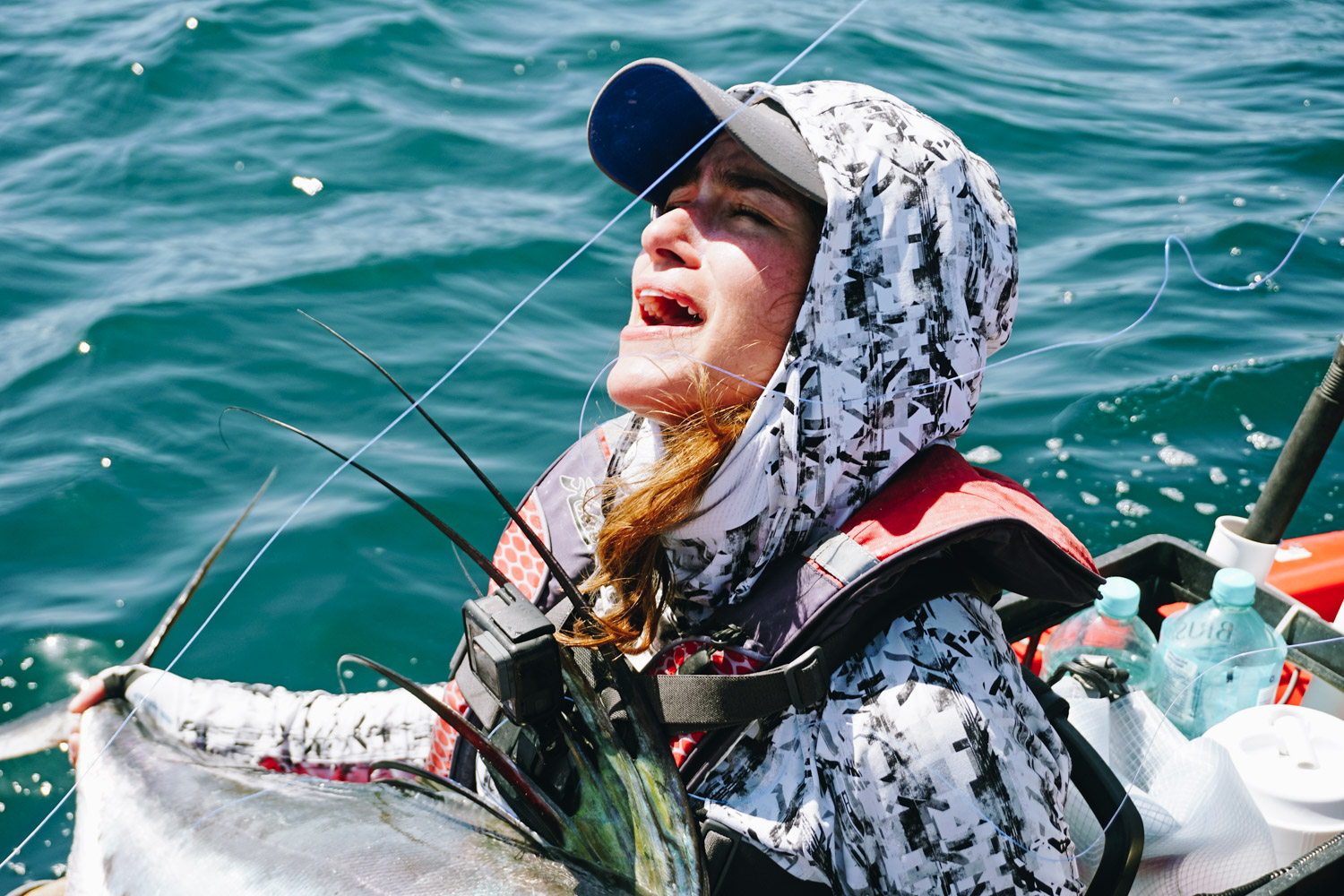
After a few quick photos, we released the healthy fish back into the ocean. Rob, Kevin and Richard gave me high fives and then left me to soak in the moment. As the Panga drifted away, I took a deep breath and raised my palms toward the sky in thanks.
Suddenly it hit me. Tears streamed down my face. I gasped. I smiled. I sobbed. It had been a challenging year. A challenging several years, actually. Full of plenty of good, but marred by uncertainty, fear, loneliness, and countless things inexplicably not working out. Again today, everything that could have gone wrong, very nearly went wrong. But they didn’t. Today, somehow, it all…just…worked.
After a few quick photos, we released the healthy fish back into the ocean… I took a deep breath and raised my palms toward the sky in thanks.
On the last night of the trip, several members from the group gathered on the beach. Bellies full of mackerel ceviche and Panamanian lager, we pointed out constellations and watched for shooting stars.
I didn’t quite understand then what brought me to Panama. I didn’t know if my new career was the right move, or why my life partner seemed to be eluding me. I didn’t know why I’d been putting so much time into solo trips and solo fishing, and I certainly had no idea where my life was headed next. But right here, in this moment, I knew I was exactly where I was meant to be. And that was enough.
Natalie Dillon is a writer, angler, yogi, adventurer, video creator & self-proclaimed Earthling. While she makes her home in the Great North of Minnesota, a thirst for nature, culture, challenge & learning pull her around the country and the world. See more from Kourtney on Instagram @nattieupnorth and on YouTube.
Be the first to comment